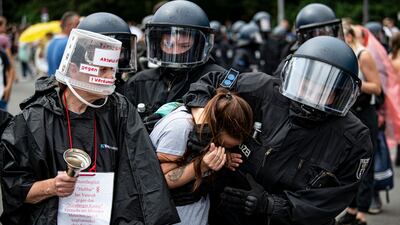Thousands of people turned out in Berlin on Sunday to protest against the German government’s coronavirus measures despite a ban on gatherings, leading to clashes with police and more than 500 arrests.
Authorities banned several demonstrations at the weekend, including one from the Stuttgart-based Querdenker movement, but protesters in Berlin defied the ban.
Berlin police sent more than 2,000 officers to disperse the crowd, but said those who sought to redirect protesters or disband larger groups were “harassed and attacked".
“They tried to break through the police cordon and pull out our colleagues,” Berlin police said.
Officers were forced to use irritants and batons, it said.
As the crowds made their way from the Charlottenburg neighbourhood of Berlin, through Tiergarten park and towards the Brandenburg Gate, police used loudspeakers to issue warnings that they would use water cannon if protesters did not disperse.
By Sunday evening, police had arrested 500 people, German media reported, and protesters were still marching through the city.
Germany eased many of its coronavirus restrictions in May, including reopening restaurants and bars.
But many activities, such as dining in restaurants or staying in a hotel, require proof that a person has been either fully vaccinated against the virus, has recovered from infection or can show proof of a recent negative coronavirus test result.
Although the number of new cases in Germany remains low compared with neighbouring countries, the Delta variant has sparked an increase in infections in the past few weeks.

On Sunday, Germany reported 2,097 new cases, an increase of more than 500 compared with the previous Sunday.
The Querdenker movement, the most visible anti-lockdown group in Germany, has drawn thousands to its demonstrations in Berlin, uniting a disparate mix on both the right and the left, including those opposing vaccinations, conspiracy theorists and right-wing extremists.
This year, Germany’s domestic intelligence service said the movement was becoming increasingly radical and put some of its followers under surveillance.
Wolfgang Schauble, President of Germany’s Parliament, criticised the movement on Sunday and urged the public not to be fooled by “cheap slogans".
“If practically all experts worldwide say the coronavirus is dangerous and vaccination helps, then who actually has the right to say, ‘Actually, I’m smarter than that?’” he told the Neue Osnabrucker Zeitung.
“To me, that is an almost unbearable level of arrogance.”
The latest protests follow other demonstrations against coronavirus measures across Europe.
On Saturday, more than 200,000 people in France protested vaccination requirements for the third straight weekend, at times clashing with police.
About 80,000 people participated in demonstrations in cities across Italy last weekend.


